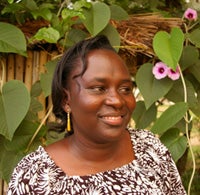News
Training Midwives to Care for the Mothers of South Sudan
- 19 May 2011
News
JUBA, South Sudan — Following decades of conflict and uncertainty in South Sudan, everything has to be rebuilt. Although the region’s capital, Juba, is now thriving following five years of peace, rural areas lack even the most rudimentary infrastructure: health clinics, schools and roads.
South Sudan’s maternal mortality ratio is the highest in the world. For every 100,000 live births, about 2,054 pregnant women die due to labour and delivery complications. Most of these deaths would be avoidable – if women had access to obstetric care.
When midwives are properly educated, empowered, and authorized with essential basic life-saving competencies, they can avert the vast majority of maternal deaths. But South Sudan, with a population of more than 8 million, has only about 10 midwives with diplomas and fewer than 100 ‘community midwives’. The training of midwives is inconsistent and the profession often garners little recognition, with meagre incomes, difficult working conditions and limited career opportunities.
UNFPA is working on several fronts to address the pressing need for skilled birth attendance. The Fund supports a Diploma Nursing and Midwifery education programme in Juba and Community Midwifery education programmes in the rural towns of Kajo Keji and Maridi.
In early 2011, UNFPA also recruited the first group of 15 out of an expected 18 international midwives through United Nations Volunteers (UNV) , in collaboration with the South Sudan Ministry of Health and funds provided by the Australian government. Working at primary health care level and within the local communities, the UNV midwives provide culturally sensitive midwifery care, counselling and support as well as capacity building of community and student midwives in the states where they are deployed.
Atieno Ogol, from Kenya, is one of the UNV midwives who is now working at Bentiu Hospital, Unity state. As Ms. Ogol quickly noticed, social determinants such as poverty, social exclusion and low levels of education all contribute to maternal and infant mortality.

In Unity state, many adolescents, some as young as 14, give birth, even though such early pregnancies greatly increase the risk of complications and death. In the patriarchal culture, where women are commodified, most are obliged to obey their husbands. Many are forced by their fathers to marry in order for their family to collect a dowry. They have little say about when to get pregnant and where to give birth. Even in case of medical emergencies, these women are denied the right to decide over their own bodies.
Ms. Ogol has witnessed cases where a woman in immediate need of a Caesarean refused treatment, because neither her husband nor his relatives had given their consent for the procedure. “You can end up losing a woman,” Ms. Ogol explains. “If she would die on the operating table without his permission to undergo surgery the family of her husband might violently reclaim the dowry from her relatives.” Thankfully this woman’s husband arrived in time to give permission for the procedure.
Operating in a challenging cultural environment, Ms. Ogol also works closely with traditional birth attendants. These birth attendants are mainly elderly women who support mothers during labour and pregnancy. They are well respected among communities because of their age and experience and are often called upon by relatives when an expecting mother is about to give birth. However, they lack the training, skills and equipment to perform emergency obstetric procedures, and are not recognized by formally educated staff at local hospitals. As a result, traditional birth attendants are hesitant to refer pregnant women to professional doctors when complications arise.
Working closely together with both the hospital as well as with the birth attendants, Ms. Ogol is trying to bridge this gap. “We should not want to get rid of the traditional births attendants, but help to improve their skills,” she explains. She is aware of the challenges involved in building the capacity of the women; as a younger educated woman it took time before the older women in the community could trust her. “You can’t just go to the flipchart, and start lecturing them as if you are their boss,” Ms. Ogol says. “Instead, I tell them what we are going to discuss today, and we then sit down together and share our experiences.”
On the occasion of the International Day of Midwives, on 5 May 2011, the National Nurses and Midwives Association of Southern Sudan was launched in Juba. It is expected that the students pursuing the Diploma in Midwifery and over 60 community midwifery students will join the association.
“My mom died during delivery,” says Taboo Florence Josef, who is currently studying midwifery. “My sister also died in 2006 because of obstetric labour. So I want to be a midwife, I don’t want any mother to die during pregnancy.”
Following a referendum on self-determination earlier this year, South Sudan will become this coming July the 196th country in the world. As Southern Sudan emerges as an independent nation, over 3,000 midwives are still needed to ensure safe motherhood throughout the region. The progress made so far may be an indication that with the right political will and investments this challenge can be overcome.